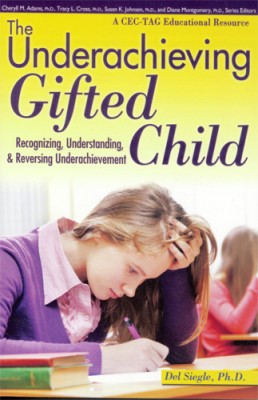It takes extra time and effort for teachers to learn what subjects their students are passionate about and then create lessons that tie in to those interests. But the link between student interest and performance is undeniable, said Neag School of Education professor and teaching fellow Del Siegle, Ph.D.
“Numerous studies show the one element that’s always linked to classroom success is interest,” said Siegle, who at UConn teaches graduate courses in gifted education, creativity and research design. “Students pay better attention and work harder when they care about the topic that’s being presented and are shown how it relates to their life.”
Most educators are aware of this fact, Siegle said, yet too few consistently put it into practice. The result is many talented students not giving their all, or achieving their potential, in school.
Siegle’s book The Underachieving Gifted Child: Recognizing, Understanding, and Reversing Underachievement provides educators and parents with a comprehensive overview of why bright students may underachieve, as well as how teachers can make lessons more engaging. Written in straightforward, easy-to-understand language, the book is available in paperback and electronic form.
“It’s important to note that in the past, IQ scores were used to determine whether a child was ‘gifted,’ but now we know that ‘giftedness’ comes in many forms and involves more things than just intelligence,” said Siegle, past president of the National Association of Gifted Children and coeditor of the Journal of Advanced Academics. “Some people are gifted leaders, some people are gifted in music, some people are gifted in math or language. Everyone has talent of some kind, and I believe one of our responsibilities as educators is to help identify and bring out each child’s individual talent.”
The importance of good work habits, an explanation of the various ways children underachieve, and suggestions of how parents and teachers can help students develop their abilities are among the many topics Siegle tackles in the The Underachieving Gifted Child. Woven into recent research findings are also effective, proactive strategies that can be used at school and home, said Siegle. Advice includes:
* Find out what kids are interested in, and then link their interests to lessons at school. “This is probably the single most important step. Every piece of evidence proves that kids pay attention, work hard and do better when lessons are meaningful and tie into their lives,” he said.
* Help kids set short- and long-term goals. Establish benchmarks, give direction, document progress and celebrate success. “Success builds confidence and makes students want to achieve more,” he said.
* Avoid -est words like greatest, quickest, smartest or fastest. “If they’re the best, there’s no room for improvement,” Siegle said. Students should always feel that they can grow and achieve even more, and that they aren’t already as good as they’ll ever be.
* Model the reality that success requires effort. Rather than complain about struggles at work, parents should share their successes.
“Kids need to understand that success isn’t something that just happens—it’s something they have to make happen,” Siegle added. “For some, learning comes easy. But most people have to work at it. And everyone loses when talented isn’t nurtured. One of the kids sitting in a classroom today may have inside them the ability to cure cancer or find a world-changing alternate energy source. Not nurturing talent doesn’t just lead to personal loss, but societal loss.”



